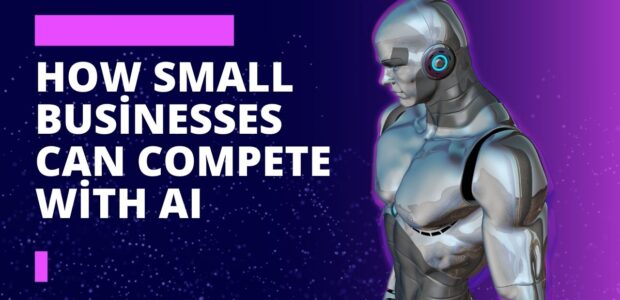Artificial Intelligence (AI) is transforming industries at lightning speed—automating tasks, analyzing data, and even creating content. For small businesses, this shift may feel overwhelming, but 2025 is not the end of small business—it’s the beginning of a smarter, more competitive era.
Here’s how small businesses can compete—and thrive—alongside AI.
1. Leverage AI Instead of Fighting It
Instead of viewing AI as competition, small businesses should see it as a tool.
-
Use AI-driven marketing tools for email personalization and customer segmentation.
-
Adopt AI chatbots to handle FAQs and basic customer support.
-
Rely on AI analytics to understand buying patterns.
👉 Example: A local bakery can use AI-powered social media tools to schedule posts, generate captions, and target ads more effectively—saving time and money.
2. Focus on Human-Centered Experiences
AI can automate, but it can’t replace human connection.
-
Build relationships through personalized service.
-
Offer community events, workshops, or loyalty programs that AI competitors can’t replicate.
-
Highlight authenticity—customers increasingly value businesses with a human touch.
👉 Example: A boutique coffee shop can host community tastings and tell the story of their beans, something a robot café can’t replicate.
3. Differentiate with Creativity & Storytelling
AI is great at efficiency, but it struggles with originality and emotional resonance.
-
Create unique brand stories.
-
Showcase behind-the-scenes processes (craftsmanship, founder journey, sustainability practices).
-
Use blogs, TikTok, Instagram Reels, and newsletters to highlight creativity.
4. Adopt Affordable AI Tools
Small businesses don’t need enterprise-level AI. In 2025, affordable AI tools are everywhere:
-
Copy.ai, Jasper → content creation
-
Canva AI → graphic design
-
ChatGPT plugins → customer engagement & planning
-
HubSpot AI → CRM automation
Using these tools levels the playing field with larger companies at a fraction of the cost.
5. Invest in Niche Expertise
AI thrives on general tasks but struggles with specialized knowledge.
-
Become the go-to expert in a niche market.
-
Provide customized solutions instead of one-size-fits-all services.
-
Offer consulting, tailored products, or local expertise that AI giants cannot replicate.
6. Embrace Agility and Speed
Big corporations often move slowly. Small businesses have the advantage of being flexible and fast.
-
Quickly test new tools, campaigns, or products.
-
Pivot strategies based on customer feedback.
-
Stay ahead by adopting trends faster than larger competitors.
7. Prioritize Trust & Transparency
With AI-generated content flooding the internet, authenticity will be priceless in 2025.
-
Be transparent about how your products are made.
-
Share testimonials, user-generated content, and real stories.
-
Position your business as a trustworthy, ethical alternative to AI-driven giants.
🔑 Key Takeaways
-
Don’t compete against AI—compete with it.
-
Focus on human experiences, creativity, and trust.
-
Use affordable AI tools to scale operations without big budgets.
-
Small businesses have an agility advantage in a rapidly changing world.
In 2025, the winners will be the small businesses that blend AI efficiency with human authenticity.


